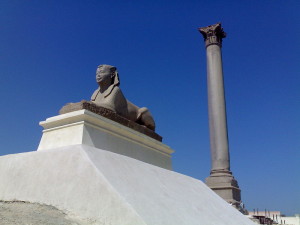This is actually going to be a five, not a four, part series.

The most fertile and revolutionary place for math and science in the West was the city of Alexandria in the first centuries of the Common Era. This is where the demanding theoretical philosophy of the Greeks met the more practically minded math of the Egyptians. Scholars took the leap into theorems based on what would become the discipline of algebra, trusting in what had validity in solving problems in the real world. People enjoy the Fran Lebowitz joke that children are right to sleep through algebra because “In the real world, I assure you, there is no such thing as algebra,” but constructs are necessary for us to understand much of the real world.
Alexandria meant the breakdown of limitations imposed by Greek philosophy. The erasure of lines between pure and practical mathematics, pure and practical science, allowed both areas to flourish. Knowledge is furthered most by collaboration between cultures. Scholars who came together at Alexandria did, however, share a motivation to become closer to the gods through their understanding of math and science. With the tolerance characteristic of polytheistic religions, they were not bothered by the fact that they worshiped different gods, or they saw themselves as worshiping the same gods despite differences in ritual and mythology. By the end of the fourth century, scholars were probably on the cusp of discovering how the earth travels around the sun, an idea that had been proposed many centuries earlier yet had been rejected, despite its attractive simplicity, due to gaps in knowledge.
And then the Christians came. The destruction of the Library of Alexandria, the murder of the scholar Hypatia, and other atrocities against learning were a systematic attempt, ultimately unsuccessful, to destroy “heathen knowledge.” Science and mathematical philosophy were seen as pagan disciplines. The “heathen temples” which the Christians were so bent on eradicating were centers of education much like the monasteries of the Middle Ages, except the pagan temples were not constrained to make knowledge fit a highly developed dogma as the monasteries were.
Learned refugees from Alexandria escaped to the coast of Anatolia. Mathematical scholarship resumed in the Arab world, continued along the Indus River, and was tolerated to some degree by the Eastern Orthodox Church, but religious and political barriers discouraged widespread cultural exchange.
